
Americans Abroad in Literature: A Passport to Reading
With Appearances From James Baldwin, Henry James, and More
I’ve always gotten a kick out of Holly Golightly’s visiting card from Truman Capote’s novella Breakfast at Tiffany’s: her name, “Holly Golightly,” and below just one word: “Traveling.”
In our current pandemic era, when travel has all but come to a standstill, one of my favorite courses to teach at Williams College seems even more relevant. The title is “Americans Abroad.” While this may bring to mind the wealthy robber barons and their daughters on grand tours looking for titled European husbands, the subject is much deeper, more complex, and irreverent.
Starting with Abigail Adams and ending in the ever-shifting present day, we read books by authors who left the United States for all kinds of reasons. A few hoped to find themselves; others, to leave that self far behind. Some were looking for inexpensive wine and Parisian chambres de bonne, others wanted to get away from their parents. Many wanted an alternative life free of the social/racist/ gender/economic oppression they experienced in the United States. Many wanted all of the above. Some brave, inexperienced boys joined the Lincoln Brigade and went to fight against Franco in the Spanish Civil War. Some gals, like Martha Gellhorn, wanted to be where the boys were: enmeshed in the action and writing about it as the first major female war correspondent.
Below is a selection of books from this evolving syllabus. Whether you can travel or not, all of these books make us reflect on what it means to be somewhere else and explore the joys and travails of culture shock. This seems to be as good a time as any to reflect on what we experience when we move around the world—whether internationally or at home—and how the world experiences us. The major themes are: what does it really mean to be “American”? How much of travel is reality, and how much is fantasy? This broad subject has a great soundtrack too, so before you start reading put on a vinyl of Miles Davis’s Sketches of Spain, or Ella singing “April in Paris”—that classic tune written by two New Yorkers, Vernon Duke and Yip Harburg. Harburg had never been to France. The chestnuts in blossom were a figment of his imagination.
The books we read cover a wide range of genres (fiction, essay, letters) voices and experiences. What follows is a sample. I’m skipping Hemingway because he doesn’t need me, but he’s always in the mix. The one thing all of these authors have in common is that whether they went abroad for a time or forever, they wrote in English for their audience back home. Their dialogue was with their fellow Americans. I focus on France because it is the classic destination for the American traveler and the available works are an embarrassment of riches. I focus on Spain because the canon is much slimmer but fascinating, and it is so close to my heart and research.
*
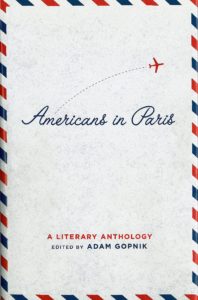
Adam Gopnik (editor), Americans in Paris
(Library of America)
I love the way the selections in this book have been curated. In particular, I like to stretch back to some of the very first Americans Abroad, including Abigail Adams (1774-1818). In 1784 the future first lady went to join her husband, John Adams, in France where he had a diplomatic post. In her early letters home, we see her great unhappiness. Her husband and Benjamin Franklin are having a grand old time, but she finds Paris dirty, the women dangerous, and she longs for her friends and home in Quincy, Massachusetts. Her difficulty in adjusting goes against the grain of the romantic idea most people have about Paris, and allows us to immediately question the stereotypes we have about our cultures and others, and how gender factors into travel.
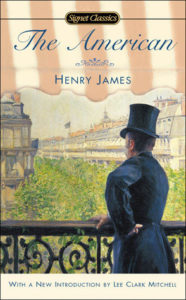
Henry James, The American
(Prince Classics)
Protagonist Christopher Newman’s name says it all: new world, innocents abroad, conquest. Newman is an explorer from San Francisco and is trying to bring Paris to its feet with his fortune and his rags to riches tale. One of the original mansplainers, his large legs are comfortably stretched out in the uptight salons of the aristocracy where he takes up a great deal of space and hotly pursues his prey, the elegant widow Claire de Bellegarde. We first meet him at the Louvre trying to buy a copy from a pretty young artist. “Combien?” is his winning opening line, setting the bar low for the rich American abroad for time immemorial. But this is not an “us against them” kind of tale. If this American is oafish, the French are frankly frightening. I don’t want to give away too much of the story, but have fun with this classic American Abroad novel. James did, and his amusement leaps off many pages. He wrote it as a serial for The Atlantic Monthly starting in the winter 1875-1876. Don’t skip his wonderful preface.
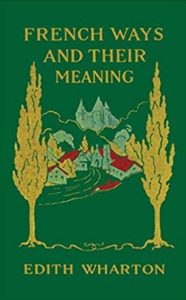
Edith Wharton, French Ways and their Meaning
(Countryman Press)
Wharton (a close pal of Henry James) is a great novelist and a wonderful non-fiction writer. This short volume is a collection of essays that she wrote for The Women’s Home Journal in 1919. She was writing to a magazine audience of American wives and mothers whose sons and husbands, nephews or brothers were off in France fighting in World War I. Wharton knows that most American women will know little about France, and tries to bring them closer to their their French counterparts. She explains what an important role French women have in all areas of French society, from business to pleasure. One can imagine some raised eyebrows from her original audience when they read that American women, compared to French, are in the “kindergarten of life.” This book should get everyone discussing Wharton’s goals in writing these essays to her far away compatriots. Unlike James, her stance is quite clear: Vive la France. If you’re on the east coast, take a socially distanced tour of her amazing home in Lenox, MA, The Mount.
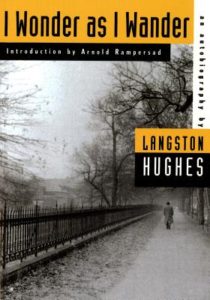
Langston Hughes, I wonder as I wander
(Hill and Wang)
Langston Hughes had a truly global life, and was a prolific writer. He was a poet, but also a journalist and autobiographer. Pretty much any essay in this book is fascinating, but I especially like the ones written from Spain during the Spanish Civil War. Hughes was in the thick of the danger, reporting from Madrid as the war correspondent for the Baltimore Afro-American in 1937. The Spanish Civil War was tremendously important for African Americans, 90 of whom joined the Abraham Lincoln Brigade volunteers who went to fight in Spain. All of them risked their lives and United States citizenships to do so. This was not some distant European war to them, but the prelude to World War II, the decisive showdown between fascism and democracy. Hughes was excited to be in Madrid, surrounded by poets, generous and brave madrileños, Lincolns, and Hemingway himself.
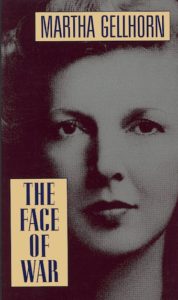
Martha Gellhorn, The Face of War
(Grove Press)
Gellhorn now is mostly forgotten except when she is remembered as Hemingway’s glamorous wife number three (the marriage lasted from 1940 to1945).She should be thought of as one of the best and most influential war correspondents that ever lived. She was a full-time globetrotter, covered every major conflict anywhere in the world, and was an activist, pacifist, and lucid observer and writer until her death in London in 1998. She cut her teeth as a war correspondent in Spain, where she wrote for Collier’s and The New Yorker. Her war writing can be poetic, and has been massively influential in the way it describes catastrophic events from the human level. The response of individual Spaniards to bombs is recounted in sober detail. We feel and see their terror as we would in a great Capa photograph. There is no pulling at heart strings. Just the quotidian horror of war.
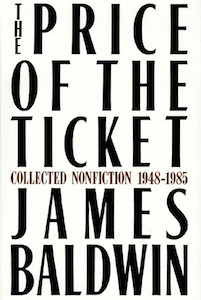
James Baldwin, The Price of the Ticket
(St. Martin’s Press)
This is my favorite title on the list. The price of the ticket is metaphorically infinite. Every time I read James Baldwin I regret that he wasn’t taught more widely when I was in school. This collection of essays is far ranging and exciting to read. For my “Americans Abroad” theme, both the introduction and the chapter “The New Lost Generation” are standout pieces. Baldwin goes to Paris to save his life from the racism and despair of the United States. In hindsight, we may think of Baldwin and Paris as inseparable, but his first impressions of the postwar city in 1948 were not of the welcoming, cozy Paris described in Hemingway’s Moveable Feast. Baldwin’s description of his motives for moving to France, and his deep culture shock and longing for the basic creature comforts of American life, are moving and often amusing. His complaints have a bit of Abigail Adams’s humor, and his displacement echoes of Henry James. Baldwin kept a portrait of James over his writing desk.
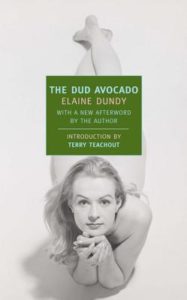
Elaine Dundy, The Dud Avocado
(New York Review of Books)
This may be the best novel you’ve never heard of. It was a smash hit in its time (1958), championed and blurbed by Dundy fans Groucho Marx and Hemingway. Dundy was married to the terrifying theater critic Kenneth Tynan. The Dud Avocado, her first novel, was so successful that it put the last nail in the coffin of their marriage. Tynan, after all, had married an actress, not a brilliant novelist. Dundy’s main character, Sally Jay Gorce, hits Paris as the quintessential young American girl abroad hellbent on not being an American abroad for one second. She wants to eschew all the clichés of other expats and tourists. Her attempts at fitting in to the local habitat, seducing a European aristocrat, and trying to become a cosmopolitan are as hilarious as they are heartbreaking. She is a very young woman, after all, brave but alone, and far from everything she knows.
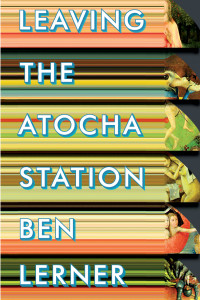
Ben Lerner, Leaving the Atocha Station
(Coffee House Press)
Ben Lerner is a poet and novelist. In Leaving the Atocha Station we meet Adam Gordon (who could really be the literary grand nephew of Sally Jay Gorce). Adam is in Spain on a Fulbright Grant working on an intense array of projects: treating his anxiety and feelings of depersonalization with copious amounts of prescription drugs and hash, visiting the Prado museum, becoming a poet who hates living poets and poetry readings, and trying to infiltrate hip Spanish social circles and explore language and love in a new language. His riffs on semi-bilingual attempts at conversation are the most perceptive and funny portraits I’ve seen of life lost in translation. He also explores the full extent of inventing a new persona for a new place, and tells delicious lies in his attempt to gain attention and sympathy from attractive young women. The novel has a serious underbelly. Adam, who is from Topeka and had so far been sheltered from “history,” collides directly with the tragic Atocha Trains Station bombings of 2004. Suddenly, he realizes he’s only a small part of a much bigger world picture.
*
What is next on the Americans Abroad Agenda? A future syllabus would have to include Separated by Jacob Soboroff, and/or a collection of articles by Jonathan Blitzer of The New Yorker and other accounts of what has been happening to immigrant families trying to get to, or stay in, the United States today. What does it mean to be American now? Who is making the decisions? What is happening to the children being separated from their parents?
__________________________________
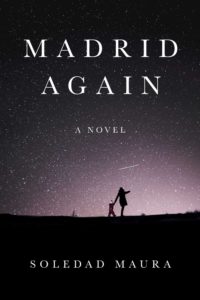
Madrid Again by Soledad Fox Maura is available November 17th, 2020 from Arcade Publishing.
Soledad Fox Maura
Soledad Fox Maura is a professor of Spanish and Comparative Literature at Williams College. She is the author of Exile, Writer, Soldier, Spy: The Life of Jorge Semprún, listed as one of the top “literary lives” by the Wall Street Journal in 2019. Her first novel, Madrid Again will be published by Arcade Books. She is on Goodreads and Instagram as Soledad Maura.



















